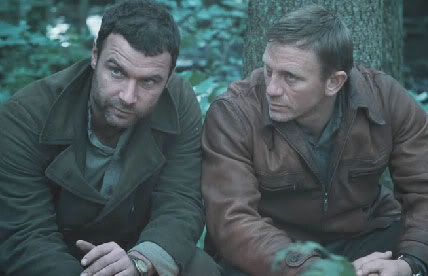
I was hoping to have reviews of current movies ready to go for the next couple of weeks, specifically “Up” and “District 9”, both of which I’m quite eager to see. Unfortunately, the same financial stranglehold that keeps my wife & I from going to BlizzCon or Cape May or even Philadelphia for a day keeps us from even going to the local cinema. Thankfully, Netflix still has a reasonable price tag, and along with the internet connection that brings us World of Warcraft (more tomorrow) and the DVR that saves episodes of NCIS and Top Gear, there’s more than enough material for me to keep this blog current. In fact, I might review some of my established favorite films in the near future, such as Ronin, Layer Cake, Snatch, and Smokin’ Aces. For now, let’s leave the woes of financial crunch behind and examine the latest historical melodrama brought to us by Edward Zwick.
This one stars Daniel Craig, Liev Schreiber, Jamie Bell, Alexa Davalos, George MacKay, Allan Corduner, and Mark Margolis.
Stuff I Didn’t Like
- Edward Zwick’s movies are not known for their brevity. While I will be praising him in short order for other things, some of the scenes he shoots go on a bit longer than might be necessary, at least when it comes to character development. For example, it doesn’t take much to remind us that Daniel Craig’s character is sick. One scene of him coughing violently in the semi-darkness of his forest lean-to is enough for most. We really don’t need three.
- The difference between this film and, say, Schindler’s List is that while the writers and actors do their utmost to help us invest emotionally in the characters – real-life historical figures, mind you – there’s something of a disconnect that happens somewhere. We don’t see a great deal of what drives these people to live rough in the forest for months and years. Schindler’s List gave us a more immediate, intimate and menacing Nazi presence, and Zwick’s previous film The Last Samurai gave us a good dichotomy between the samurai living a more pastoral, honor-based life in the face of progressive capitalist modernism. The Nazi’s might as well be working for the Sherrif of Nottingham in Defiance. There’s emotional scenes, to be sure, but this lacks the depth of the aforementioned films. It’s not enough to completely turn me off of the film, it’s just shallower than expected. (While we’re on the subject, The Last Samurai might warrant a review as well.)
Stuff I Liked
- Daniel Craig. He continues to project a quiet, calculated confience. It’s the sort of acting that makes him a superlative Bond and carried the entirety of Layer Cake. Some might see his performances as stiff or impersonal, but Craig has mastered the fine art of carrying a great deal of emotion under a stoic expression, and releasing that emotion with little to no warning. It can be a bit one-note at times, but the note has fine tone and never gets obnoxiously loud.
- The romance is necessary to drive the tale but never grows overly sappy. The humor comes naturally and doesn’t feel shoehorned in just to break tension. Despite being a melodrama, the film isn’t over-acted at all. This underlines the fine storytelling rather than overshadowing it.
- Like in his other films on war, Zwick makes the combat gritty and the action frantic and immediate without being unnecessarily gory. His scenes are not quite as shocking and riveting as, say, Saving Private Ryan, but they definitely drive home both the horrors and triumphs of war.
Stuff I Loved
- Liev Schreiber is, I feel, really coming into his own as an actor. He delivers a powerful and nuanced performance here, and does so without chewing on any of the scenery. Another actor might have made Zus Bielski into a warmonger, but Liev tones down the thirst for vengeance with an understated intelligence that what he does is in the best interests of his people, moreso than his brother’s plan to simply hide in the woods. Both he and Craig carry a lot of emotion under smudged, stony exteriors, and it’s a joy to see them both on screen at the same time.
- The languages. The story occurs in Belarus, and we hear Russian and German spoken with fluent, natural accents. I would have loved to hear a bit of Hebrew in the beginning of the film that transitioned into English, not unlike the opening of The Hunt for Red October.
- The film shows a people driven into the wilderness by circumstances beyond their control. It’s as much a cautionary tale as a character study. Everyone involved makes hard decisions and finds themselves in situations beyond their ken, where adaptation and ingenuity are more important than social standing. Should we ever find ourselves in such situations, it’s important to remember that our willingness to contribute towards and make sacrifices for the entire community will mean more in the long run than our own comfort. When you watch Defiance, it’s difficult not to put yourself into the situations these formidable people are thrust into, wondering how you might cope without amenities such as heat or running water. Or the Internet.



Leave a Reply